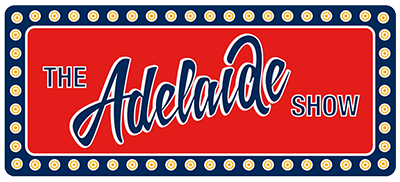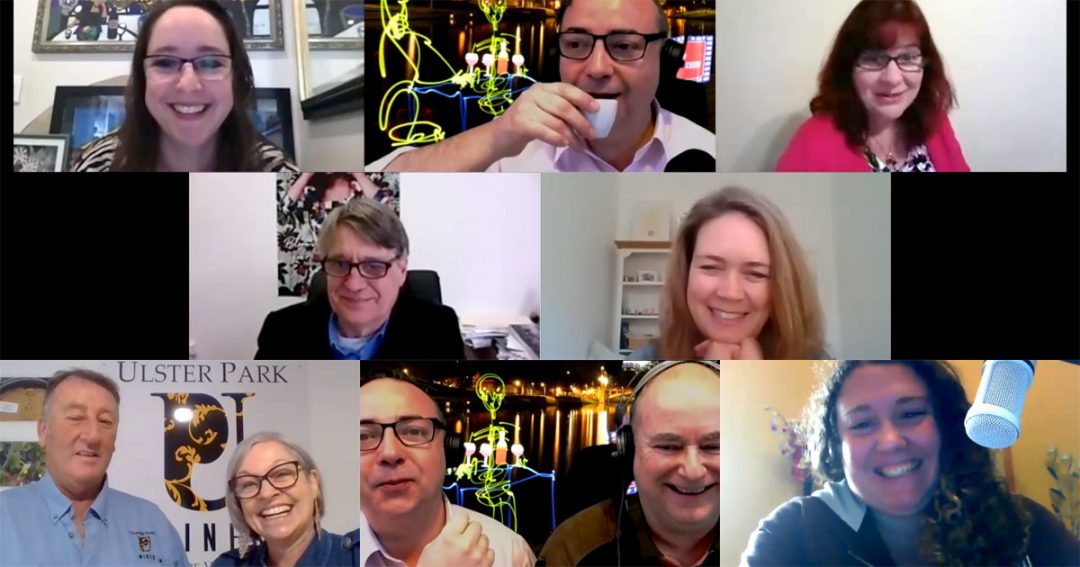In this week’s episode of The Adelaide Show, we explore writing the great novel with local authors, publishers, winemakers, and a poet.
Our three authors are, Jane Ainslie, Lee Hopkins, and Michelle Prak, and our two publishers are, Rommie Corso and Michael Bollen
Our winemakers, who have provided The SA Drink Of The Week, are Michael and Sharryn Smith from Ulster Park in Auburn.
In the Musical Pilgrimage, we hear from poet, Sara Jane Justice.
The Adelaide Show Podcast is discussed in the current, May 2020 issue of SA Life Magazine.
And please consider becoming part of our podcast by joining our Inner Circle. It’s an email list. Join it and you might get an email on a Sunday or Monday seeking question ideas, guest ideas and requests for other bits of feedback about YOUR podcast, The Adelaide Show. Email us directly and we’ll add you to the list: [email protected]
If you enjoy the show, please leave us a 5-star review in iTunes or other podcast sites, or buy some great merch from our Red Bubble store – The Adelaide Show Shop. We’d greatly appreciate it.
And please talk about us and share our episodes on social media, it really helps build our community. Oh, and here’s our index of all episode in one concise page
Running Sheet: Writing the great novel
00:00:00 Intro
Introduction to the show.
00:03:30 SA Drink Of The Week
2017 Matriarch Shiraz, Ulster Park Wines, Auburn, Clare Valley, with Michael and Sharryn Smith.
Lee’s link:
https://www.amazon.com.au/s?k=meningie+man&i=stripbooks&ref=nb_sb_noss
00:18:00 Jane Ainslie, Michelle Prak, Rommie Corso, and Michael Bollen
Writing the great novel. Apparently we all have one inside us and we were told by motivation gurus and life coaches that the time of isolation would be the best time to write it. Well, that hasn’t happened for me. And I suspect it hasn’t happened for most people. So, how do we realistically reset our expectations to start writing over the next year as life returns to normal? To share their insights on this topic, I have two authors, Jane Ainslie and Michelle Prak, and two publishers, Rommie Corso and Michael Bollen. Welcome.
Ever wanted to #write that great #novel? We have #authors and #publishers on The #Adelaide Show #podcast this week to inspire you and share plenty of insights. Along with #wine and #poetry. Come inside! https://t.co/wMq7ec4GaK
— The Adelaide Show (@TheAdelaideShow) June 7, 2020
Let’s start with that old saying about all of having a book inside us. The full quote, as used by Christopher Hitchens goes: Everyone has a book in them, but in most cases that’s where it should stay. I’ll start with our authors on that one. Do we all have novels inside us? And should we liberate them or suppress them?
MIchael, we’ve interviewed a number of Wakefield Press authors over the years, from Simon Butters to Don Loffler, from Denise George to Michael Maguire (I’ll list links to all those interviews in the show notes). While the rest of our discussion will be about publishing fiction, Bruce Munday’s book, Those Wild Rabbits, all about the history and impact of rabbits in Australia, produced a memorable interview for us and enlightened me to the many layers of nuance in the history of colonisation in Australia. And yet, I’m not sure I would have randomly picked it up off the shelf. What helps you decide to publish certain non-fiction books? For example, could Bruce had curried favour if he promised that every Landcare Australia member would buy a copy?
Michelle, I’ve been reading your first novel, Goodbye Newsroom, about the adventures of a journalist who’s been laid off and rebuilds her career with her sister. You have a past life as a journalist. Did you ever consider writing a non-fiction book about the state of journalism or the life of a journalist instead of using your experiences to create a fictional world?
Jane, your background in nursing has helped you create some wonderful nursing characters. For example, I was instantly on Alice’s side within the first few pages. Have you contemplated a non-fiction story about life in hospitals or nursing?
Rommie, through Hardshell Publishing, you help people self-publish, how deeply invovlved do you get in conversations with authors? For example, have you ever had to help an author forge their project from the very beginning, or are people usually kneedeep by then?
Writers from Oscar Wilde to Stephen King, have often argued that we need to be prepared to “murder our darlings” for the sake of better writing – to cull indulgent portions or characters, etc. When authors seek publishers after they’ve written something, how wedded do we become to our work and therefore, how closed off to criticism do we become?
Jane and Michelle, have you had to murder your darlings? Rommie and Michael, have you had to lay down the law on this topic?
Michelle, in the foreword to Goodbye Newsroom, you mention that after writing 80,000 words it is very unlikely you’ll ever be able to write again. You have. What happened?
Titles. What’s the trick to choosing them? My favourite is The Unbearable Lightness Of Being; that title is almost a book itself!
Jane, you recently gave away your book to anybody in the nursing profession as a goodwill gesture during the initial onslaught of Covid-19, and it got me thinking about What we get from writing a book. I produce this podcast because I LOVE being involved in sharing ideas and stories. It feeds me deep within my psyche. And in my life as a theatre critic, I see many amateur performers and technicians producing beautiful work for the sheer thrill of doing it. What are the rewards of writing in 2020? Is it monetary? Is it self-actualisation? Fame? And is there a gap between what drives us and what we get in return?
There is also a strong circuit of would-be thought leaders in social media who produce flimsy books about Twitter or business, not so much for the content but for the appearance of producing content as a way to gain status. Michael, what are your thoughts, as a publisher who must decide where to invest and risk money? Rommie, are these people a welcome part of your business?
Let’s get down to some writing tips and habits.
Jane, I think it was you who made a quip that the story of me forging documents in Budapest to get a long stay visa was a great launching point for my novel. When do we know if we have a good idea to build a book upon?
Is it enough to have a starting story or scenario, or do we need to plot out the whole story arc, or do as John Grisham does and just work out the ending before he starts writing?
What ideally comes first – the characters and story or the genre? Especially when we consider that the three Book Genres That Make the Most Money are
Romance/Erotica – $1.44 billion. … Crime/Mystery – $728.2 million. … Religious/Inspirational – $720 million. ….
For example, I see Michelle has her book classified as Romance fiction, contemporary women’s fiction, Australian fiction, and Sisters fiction. Are you comfortable with those labels? I would have thought Women’s Fiction was an outdated qualifier – or are men and women still really different at heart despite our awareness about gender fluidity?
Can you safely base characters on people you know? For example, there is someone I know who has lived a double life for many years. I’ve had to rescue him from some really seedy moments that would make for hilarious passages in a book. If I include some of these stories, he’ll see himself in the book instantly, even if I go really abstract when writing about certain events. What’s the risk of being sued for defamation? And can the Carly Simon song be a defence, eg, You’re So Vain, you probably think this book is about you?
How do we make time to write? One of our listeners, Jo Wood, says: I’ve found having the family all at home very distracting – they disturb my necessary peace! I have written more since they’ve been back at work and school than I did during isolation. Now I am trying to stick to a 1.5hr block of time where I’m not allowed on any social media. I’m allowed to look out the window or write. The idea being that eventually looking out the window will become boring so I’ll have to write. Must say I’m getting really good at identifying the 19 species of birds that visit the tree outside my window! As evidenced by my photographs of them…. maybe I need to ban the camera too….
Rommie – do you have to provide nudges and support to authors? Michael?
What’s on the horizon: Joe Evans – Ballycroft. Question. With the technology of day moving from the written word, to E books , to audiobooks. Will their be video books which may bypass any written scribe. To return back too the basics of story telling, live and real not rubbed out and re written . “B-Spoken Stories
Rommie Corso links
https://www.
https://www.facebook.com/
Also, a social enterprise Rommie is currently working on is Chook Pen Publishing (in progress). For now, there is a private Facebook group to support women writers’ by providing a safe, collaborative and creative space to develop their writing.
https://www.facebook.com/
Michelle Prak’s links
Author website https://michelleprak.com/
Media Queen, Michelle Prak’s newest novel is out now on Amazon https://www.amazon.com.au/Media-Queen-HollyAnna-Book-2-ebook/dp/B087WRQ4V7
PR website https://prakkypedia.prakky.com.au/
Jane Ainslie’s links
Jane’s website is www.janeainslie.com
And her book on Amazon is at https://www.amazon.com.au/
[I think they’ve forgotten to take it off being free so that could be good if people want to download it!]
Michael Bollen’s links
Michael writes a regular light ‘Diary of a Publisher’ column for InDaily. Latest here: https://indaily.com.au/
Also, of course, the Wakefield Press website: www.wakefieldpress.com.au — with a blog section here https://www.
And he has ‘Wakefield Weekly’ — a newsletter that goes out each Friday that they pack with news, reviews, (sometimes) giveaways, events, guest blog posts etc. People can subscribe via the website front page or just by emailing Maddy Sexton here — [email protected]
01:21:26 Musical Pilgrimage
In the musical pilgrimage, we have a poem by Sara Jane Justice, Just Asking Questions.
Sara’s links
Adelaide poetry gig guide: https://www.facebook.
Here’s this week’s preview video.
SFX: Throughout the podcast we use free sfx from freesfx.co.uk for the harp, the visa stamp, the silent movie music, the stylus, the radio signal sfx, the wine pouring and cork pulling sfx, and the swooshes around Siri.

